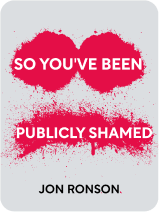

This article is an excerpt from the Shortform book guide to "So You've Been Publicly Shamed" by Jon Ronson. Shortform has the world's best summaries and analyses of books you should be reading.
Like this article? Sign up for a free trial here .
Do you think online shaming is an effective form of punishment? What are the psychological consequences of being a victim of online shaming?
Some people argue that online shaming is just commentary because it can’t hand down “real” punishment. However, making people feel ashamed is one of the worst psychological punishments out there.
Keep reading to learn about the phenomenon of online shaming.
The Rise of Online Shaming
Online shaming on social media differs from older forms of public punishment because it is democratic, anonymous, and lawless. Anyone can choose a target, and unlike a formal justice system where the accused has rights, online, no one has any rights. People can be punished without evidence and there’s no time limit on the punishment.
Online shaming on social media can be a force for a good—the public can call out previously inaccessible people and companies for objectively despicable behavior. Online shaming can force change that would be time-consuming or impossible to win through the justice system.
- Example #1: After the death of gay singer Stephen Gately, Daily Mail columnist Jan Moir wrote that civil partnerships could never have happily-ever-afters. The public was so angry that Nestlé and Marks & Spencer pulled their advertising from the Daily Mail’s website and the paper lost money.
- Example #2: When a couple lost their jobs and could no longer afford their membership fees to LA Fitness, the company refused to cancel their membership. The internet rallied and LA Fitness allowed the cancellation.
Online public shaming, while it does involve a digital “crowd,” may have a more complicated explanation than whatever scientists ultimately discover about crowd behavior.
Another scientific principle that might have a hand in shamings that get out of control is feedback loops—responses to your behavior that inspire you to change it. For example, your Speed signs are a feedback loop because they tell you how fast you’re going, which gives you an opportunity to make a change—for instance, slow down if you’re breaking the speed limit. If you do make that change, you get immediate feedback again—the next “Your Speed” sign will show you’re driving at the right speed, and some signs will even congratulate you for this. Online shaming is a form of feedback loop—if you shame someone and are congratulated, that positively reinforces your behavior and you’ll probably keep on shaming. As the shaming grows, you’ll just keep seeing posts from people who agree with you and your social media feeds will become an echo chamber.

———End of Preview———
Like what you just read? Read the rest of the world's best book summary and analysis of Jon Ronson's "So You've Been Publicly Shamed" at Shortform .
Here's what you'll find in our full So You've Been Publicly Shamed summary :
- How public shaming can ruin people's lives
- Why public shaming isn't just a way to get corporations to do the "right thing"
- 6 strategies you can use if you're a victim of public shaming






